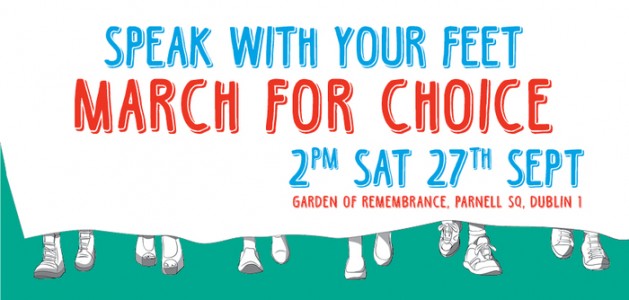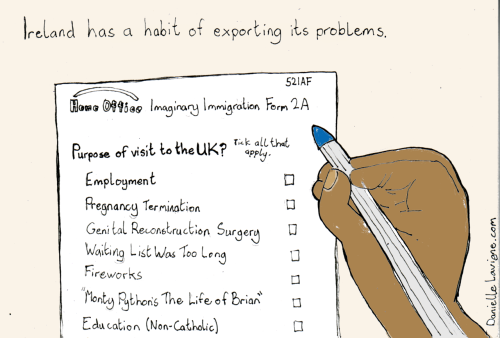“Of course women should have the right to choose. But.. shouldn’t the potential father have the right to be consulted, too?”
If you talk about abortion a lot, and you’re coming from the pro-choice side of the spectrum, you’ve probably heard this- or maybe even said it- a few times. The reasons people give for saying it tend to boil down to two basic ideas: that both people are parents of the potential child and so both should have a say, and that it can be incredibly hurtful to men who want to be parents, if their partners abort the pregnancy that they still want.
Both of those points refer to very real, significant things, and it’s only natural to empathise with people in that situation. However, I’m going to argue that, despite these, there should be no obligation on the part of a pregnant person to consult with, or even inform, their partner about their intent to terminate a pregnancy.
We Don’t Have The Right To Become Parents
Nobody- not you, not me, not your ma- has the right to be someone’s parent. We have the right to act, with consenting others, in ways that we hope will result in becoming parents. We can decide that we’d like to have kids, we can have oodles of unprotected PIV with people who’d like to have kids with us, we can- if we can afford it- have all kinds of fertility treatments to make pregnancy more likely, and, depending on our state’s regulations, we can seek to foster or adopt.
We have the right to seek to be parents. We do not have the inalienable right to become parents. Each of the ways in which we can become parents is subject to gatekeeping and the consent of others. If we wish to foster or adopt, we must satisfy adoption agencies that we are suitable parents (and, yes, in some countries, including my own, this depends on a shedload of factors, such as sexual orientation of parents, that are unfair, irrelevant and discriminatory). If we want to be biological parents? We need someone else’s consent for that, too, especially if we’re not equipped with a fully-functioning uterus to do the gestating in.
You could say that this isn’t fair. You would be right. It’s not fair that there are many, many people in the world who would love to have kids and who would make amazing parents who’ll never get to do that. But if something requires the consent of someone else to happen, and if for any reason, no matter how arbitrary, they do not grant or withdraw that consent? It doesn’t happen.
It’s not fair. But the alternative is far, far less fair.
Feelings vs Bodily Autonomy
Let’s go over one of the two major reasons given above for why partners of pregnant people should have a say in whether an abortion happens: that it can be incredibly hurtful to men who want to be parents, if their partners abort the pregnancy that they still want.
It can.
It’s not tough, really, to put yourself in the shoes of someone in this situation, even if it’s something you haven’t experienced. You want to be a parent- you long to be a parent. Hearing that your partner is pregnant, you’re overjoyed. All of the things you’ve dreamed of about being someone’s mum or someone’s dad suddenly seem real, because there’s a potential future person right there, growing. In your mind they’re already taking their first steps, you’re already teaching them all about dinosaurs and how to cycle their first bike and they’re already becoming a Nobel prize winning Olympic gymnast astronaut who never, ever forgets to call home. And in your mind they already have your eyes and your partner’s smile and they sit in that funny way all of your cousins do. And then? Your partner says that it’s not going to happen. And you? You’re expected to hold their goddamn hand through it all, and it hurts.
Yeah. I can imagine that hurting. I can imagine that tearing me apart. I can imagine it being genuinely, honest-to-goodness traumatic.
But a thing hurting our feelings- even in a way that tears us apart and leaves us traumatised and scarred- doesn’t mean that we have the right to infringe on someone else’s bodily autonomy.
Taking a moment to make a comparison- and understanding that all comparisons are incomplete- let’s liken this to breakups. Breakups and divorces can be amicable, they can be painful, or they can be gut-wrenchingly horrible. We all know people who’ve suffered for months or years after the particularly unpleasant ending of a relationship. It’s a horrible thing, it really is, and my heart goes out to people enduring it.
And yet, even with that, we understand that the right of a person to leave a relationship trumps the desire of another to continue it. We know that there is no obligation on the part of a dumper to let the dumpee attempt to change their mind and to take their (real, hurt) feelings into account when deciding whether or not to end a relationship. And y’know what else we know? That a lot of the time that would be a terrible idea.
We choose who to be partnered with.
Relationships aren’t even a binary proposition- there are countless shades of grey between strangers and partners. There’s no shade of grey between pregnant and not-pregnant. We each have the sovereign right to decide what we are willing to have happen inside our own bodies. We have the right to choose the people who we talk and consult with about that decision. And we have the right to make that decision on our own.
When it comes to abortion, our right to choose to carry a pregnancy to term or to terminate does not exist because of our genetic relationship to the fetus inside us- forcing a surrogate mother, say, to carry to term is abhorrent. Our right to choose exists solely because the pregnancy is in our body, is part of our body, sharing our blood, our food, water and oxygen. The right to choose is, at the end of the day, nothing to do with pregnancy. Pregnancy is simply a time when that right is contested. The right to choose is about our right to self-determination, nothing more.
Our desire for a certain outcome- and our desire to advocate for that outcome- can never trump another person’s right to self-determination.
She Has The Final Say, But..
People often counter what I’ve said earlier with what I like to call “She Has The Final Say, But..“. They acknowledge that a pregnant person has the right to make the decision over whether to terminate, but stress that she should have a moral obligation to, at the very least, talk to her partner.
She has the final say, but she should hear him out. She has the final say, but having a conversation is the only decent thing to do. She has the final say, but she should take his feelings into account. She has the final say, but..
“She has the final say, but..” is nothing more than an attempt to give one person’s desires priority over another’s rights. So here’s the question I can’t but ask: why are we talking about this again? If my rights trump your desires regarding me (and vice-versa), then why are we getting sidetracked from a conversation about rights with a plea to think about what rights others would, or would not, like us to exercise?
It’s difficult to see “She has the final say, but..” as anything other than a last-ditch effort to get someone to change her mind and influence her decision. What it betrays, at heart, is where a person’s empathy lies- in this case, not with the pregnant person, but with her partner. They’re not thinking about how she would feel, or how feeling obligated to have the conversation could make a potentially difficult situation that much harder. They’re thinking solely about how her partner might feel. And also? They’re betraying a profound mistrust of women’s ability to make the decisions we need to make, in the ways that are best for us.
Either She Will, Or She Won’t.
When people plead with women to discuss our reproductive choices with the men in our lives, they do so with certain assumptions in mind. When you challenge those assumptions, the answer is that of course they weren’t talking about those situations.
When people say that women discussing our abortions with our partners is, as one person said to me last week, the “only decent thing to do”, they’re thinking of a particular kind of woman, and a particular kind of partner. They’re not thinking of women in abusive relationships, or women who aren’t in relationships at all. They’re not thinking- a surprise really, given a lot of the other rhetoric about abortion- about women who mightn’t be sure of who the father of the fetus is. They’re not thinking of relationships that, for one reason or another, might be intimate in some ways but not others. There’s no talk of, say, the person I dated who told me once that if I ever had an abortion we’d never speak again. Or of the person who longed for a child, but who also regularly spent days on end unable to leave the house. The image is always of women in loving, mutually supportive relationships who for no particular reason decide not to inform their partners that they’re pregnant and planning to terminate.
That idea? Is frankly ridiculous. If people are in a relationship where conversations on abortion would be welcome, where they feel safe and comfortable sharing intimate details with each other, and where they’ll support each other? They’ll talk about it. The pregnant person will talk about it. If, however, her partner is not someone she feels safe sharing with? Or if they’re simply not the person she thinks to go to, if there’s someone else who she is closer to?
That’s why, at the end of the day, the question of whether pregnant people “should” discuss their plans to have abortions- or not- with their partners is a meaningless one. If they have the kind of relationship where they talk about those things, then they will, and admonitions to do so are unnecessary. If they don’t? Then it’s nothing more than shaming women into doing something contrary to their best interests, in a situation which could be hurtful at best and dangerous at worst.
Which is why we say “trust women”.















